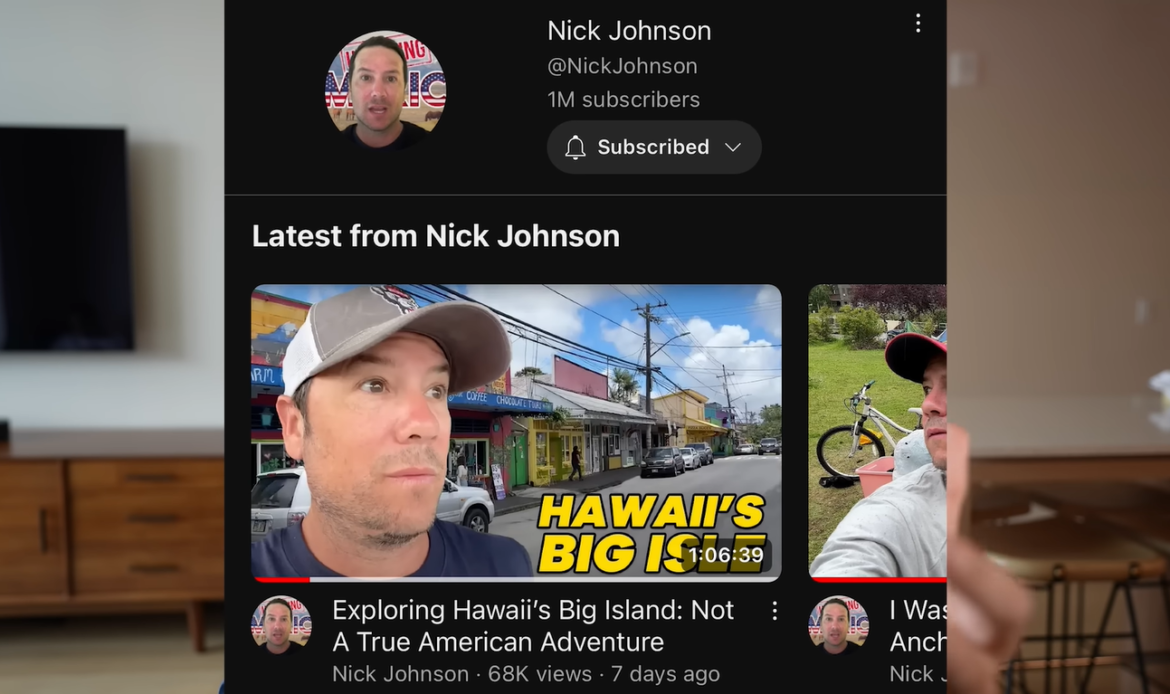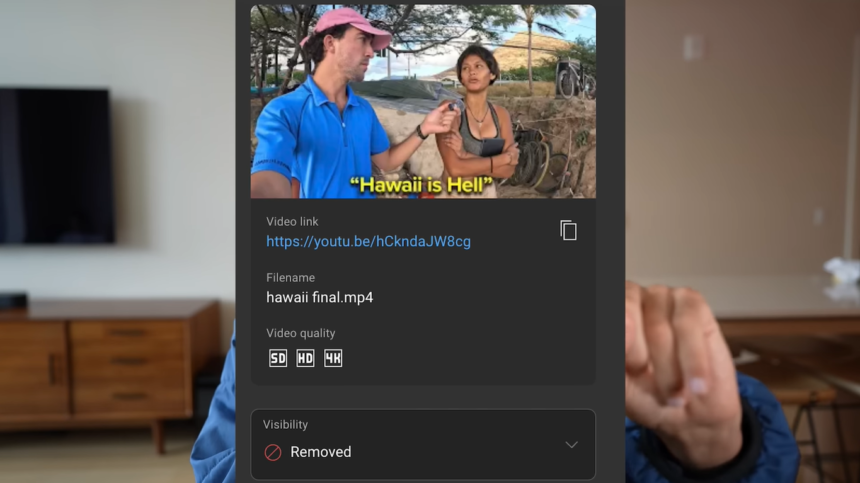In the dynamic world of online content creation, legal battles over copyright infringement are becoming increasingly common. Recently, Tyler Oliva, a prominent YouTuber known for his educational and journalistic content, found himself at the center of such a dispute. He is taking legal action against another YouTuber, Nick Johnson, for what he alleges to be an abusive and wrongful use of YouTube’s copyright system. This blog delves into the details of this lawsuit, exploring the legal framework, the alleged abuse of copyright tools, and the potential consequences of this case.
The Background: What Sparked the Lawsuit?
Tyler Oliva’s channel focuses on producing informative documentaries that shed light on various social and environmental issues. His recent project, a 33-minute documentary about Hawaii, was removed from YouTube following a copyright strike filed by Nick Johnson. The strike was triggered by a mere four-second clip in Oliva’s video—a clip that, according to Oliva, falls squarely under the fair use doctrine.
Fair use is a legal principle that allows the use of copyrighted material without permission from the copyright holder under certain conditions, such as for commentary, criticism, news reporting, or educational purposes. Oliva’s documentary, which included his own voice-over, sound design, and editing, was designed to be transformative and educational—key factors that typically support a fair use defense.

Despite these factors, Nick Johnson issued a copyright claim that resulted in the video being taken down and a strike being placed on Oliva’s channel. This strike not only affected Oliva’s income and viewership but also put his entire channel at risk. YouTube’s policy states that a channel can be permanently removed if it receives three copyright strikes, making this a serious matter for any content creator.
Understanding the Lawsuit: What is Oliva Suing For?
Tyler Oliva’s lawsuit against Nick Johnson revolves around the alleged misuse of YouTube’s copyright tools. Oliva is suing for what he claims to be a malicious and baseless copyright claim that violates the fair use doctrine. The lawsuit likely includes several legal claims, which we can infer based on the typical legal strategies employed in similar cases:
- Declaratory Judgment of Non-Infringement: Oliva may seek a court declaration that his use of the four-second clip was indeed fair use and did not infringe on Johnson’s copyright. This could nullify the copyright strike and set a legal precedent for similar cases in the future.
- Abuse of Process: Oliva could argue that Johnson misused the copyright claim process as a tool to suppress his content, knowing that it was likely protected by fair use. Abuse of process is a tort claim that can be brought when someone uses a legal process in a way that is not intended by law to achieve an ulterior motive.
- Defamation: Depending on the specifics of Johnson’s actions and statements, Oliva might include a defamation claim, arguing that the wrongful copyright claim damaged his reputation as a content creator.
- Intentional Infliction of Emotional Distress: If Oliva can prove that Johnson’s actions caused him significant emotional distress, this claim might be included. It would require demonstrating that Johnson’s conduct was extreme and outrageous.
- Monetary Damages: Oliva could seek monetary compensation for the revenue lost due to the takedown of his video, as well as any legal fees incurred during the lawsuit.
Legal Framework: Fair Use Doctrine and Copyright Abuse
The core of this legal dispute lies in the interpretation and application of the fair use doctrine. Under U.S. copyright law, fair use is determined by considering four key factors:
- Purpose and Character of the Use: Courts consider whether the use is for commercial or nonprofit educational purposes. Transformative uses—those that add new expression or meaning to the original work—are more likely to be considered fair use.
- Nature of the Copyrighted Work: The use of factual or non-fictional content is more likely to be considered fair use than the use of highly creative works like music or fiction.
- Amount and Substantiality of the Portion Used: The smaller the portion of the copyrighted work used, the more likely it is to be considered fair use. In Oliva’s case, the use of a four-second clip in a 33-minute video may weigh in his favor.
- Effect on the Market: If the use negatively impacts the market for the original work, it is less likely to be considered fair use. Oliva would likely argue that his use of the clip did not harm Johnson’s ability to profit from the original work.
Nick Johnson’s alleged misuse of the copyright claim process raises significant legal and ethical questions. YouTube’s copyright system, while essential for protecting creators’ rights, can be weaponized to silence and suppress content. The ease with which copyright claims can be filed—with little oversight—makes it a ripe area for abuse, particularly against smaller creators who may lack the resources to fight back.
Potential Consequences of the Lawsuit
If Tyler Oliva succeeds in his lawsuit, the outcome could have far-reaching implications for YouTube and its content creators. A court ruling in Oliva’s favor could:
- Set a Precedent for Fair Use Cases: A victory for Oliva could establish a stronger precedent for fair use on YouTube, providing greater protection for creators who use small portions of copyrighted material in transformative ways.
- Reform YouTube’s Copyright System: The case might prompt YouTube to reevaluate and reform its copyright claim process to prevent abuse. This could include implementing stricter requirements for filing claims or providing better support for creators facing wrongful strikes.
- Financial and Legal Repercussions for Nick Johnson: If Johnson is found to have maliciously abused the copyright system, he could face significant financial penalties, including compensatory and punitive damages. This could serve as a deterrent to others who might consider abusing the copyright system in the future.
- Impact on Smaller Creators: The case could empower smaller creators to stand up against wrongful copyright claims, knowing that they have legal recourse and that fair use is a defendable right.
Tyler Oliva’s lawsuit against Nick Johnson is not just a personal battle—it is a fight for the rights of all content creators on YouTube. By challenging the misuse of copyright claims, Oliva is taking a stand against a system that can be easily abused to silence voices and suppress important content. The outcome of this case could have significant implications for the future of fair use and copyright enforcement on digital platforms.
As the case unfolds, it will be crucial to watch how the courts interpret the fair use doctrine in this context and whether this lawsuit will lead to meaningful changes in how copyright claims are handled on YouTube. For now, Oliva’s determination to defend his rights and the integrity of his content serves as an important reminder of the need for balance between protecting intellectual property and ensuring the free flow of information.
Tyler Oliva is suing Nick Johnson for allegedly abusing YouTube’s copyright claim system. Oliva argues that Johnson filed a false copyright claim against his video, which included a four-second clip that Oliva believes is protected under the fair use doctrine. The lawsuit likely seeks to establish that the use of the clip was fair use, and it may also include claims for abuse of process, defamation, and monetary damages.
The fair use doctrine allows for the use of copyrighted material without permission under certain conditions, such as for commentary, criticism, news reporting, or educational purposes. In this case, Oliva’s use of the four-second clip in his documentary was intended to be transformative, educational, and journalistic, which are key factors that support a fair use defense. Oliva argues that his use of the clip falls within the scope of fair use, making Johnson’s copyright claim invalid.
If Tyler Oliva wins the lawsuit, it could set a significant legal precedent for fair use on YouTube, offering greater protection for content creators who use copyrighted material in transformative ways. It might also lead to reforms in YouTube’s copyright claim process to prevent abuse. Additionally, Nick Johnson could face financial penalties, including compensatory and punitive damages, which could deter others from misusing the copyright system in the future.







